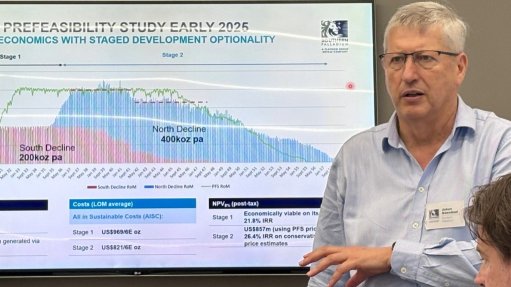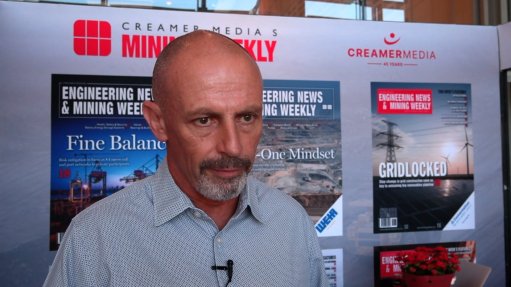ESG risks in the mining sector
The qualification and quantification of environmental, social and governance (ESG) risks and uncertainties across the mining lifecycle continue to gain more prominence and relevance in the business world.
In a panel discussion at the Mining Indaba earlier this year, led by Dr Eric Lilford and panelist SSC Group founder Fred Arendse discussed ESG issues affecting mining.
Dr Eric Lilford (EL): What do you see as the most important, inadequately regulated components of ESG in the mining sector?Fred Arendse (FA): It is not uncommon to see headlines stating that mining is destroying South Africa’s environment because mine waste is still the largest source of pollution. For example, the impact of the coal fields on scarce water resources, owing to heavy metals leachate has become untenable. Although it now has become a tourist attraction, the Big Hole, in Kimberly, is possibly the largest example of an unrehabilitated mine, not to mention the mine dumps scattered all over Gauteng and beyond.
We can only hope that the capacity of the Department of Minerals and Energy to monitor, oversee and regulate the industry will be increased and improved to prevent destruction of the environment in general.
EL: In what areas of ESG are we failing?
FA: ESG has an impact on financing, whether through equity or debt. Globally, ESG has risen to the top of the regulatory agenda with the result that for financiers, ESG is unequivocally measured with defined environmental, social, sustainability, and governance systems of measurement resulting in the coined phrase, “sustainable finance”.
For banks and insurers, the financial risks of climate change are in sharp focus as regulators set out expectations for stress testing and climate risk management. Asset and fund managers and asset owners are required by regulators and investors to embed sustainable investment throughout their businesses and to consider the full spectrum of ESG.
EL: ESG is being used as a means to force change and do things differently. Is this the new norm?
FA: Environmental issues have an impact on all levels of society and business and as a result large-scale trends shaping the ESG investing world have become well recognised. As a result, ESG initiatives have become a strategic imperative for nearly all organisations over the past year.
Increased focus and pressure from investors, regulators, employees and other stakeholders make ESG a topic that is critical at Board level. However, ESG risk management measures often fall short of the standards that companies have set themselves.
EL: Under the ESG banner, do you believe that all commodities/minerals producers (coal, oil and gas, platinum-group metals, copper, diamonds, lithium, etc) are treated equally globally?
FA: Starting with coal, the main driver is demand and if the demand is there, several factors will be overlooked. Discard coal dumps are leaching heavy metals into ground water while releasing methane.
Cobalt, a critical mineral for Lithium-Ion battery manufacture, mined in the DRC, tells its own story, specific to a country. Cobalt is mined under atrocious conditions in the DRC resulting in large scale environmental devastation. So, some commodities are treated differently to others.
EL: Identifying potential ESG outcomes can be challenging for companies. Do you believe that stakeholders appreciate the uncertainty of the potential outcomes?
FA: The full appreciation of uncertainty is based on the level of knowledge and understanding of the issues which would bring about the uncertainty. Environmental and social issues and the governance put in place to manage these issues will have a direct impact on the appreciation of ESG uncertainties.
The environmental component is probably the best known and understood part of ESG and legislation around environmental management is well developed.
Social issues covered by ESG include diversity, gender equality, mental health, forced labour, and health to name but a few. The complexities at play between human nature and the infinite number of variables present makes the social aspect of ESG extremely complex.
Article Enquiry
Email Article
Save Article
Feedback
To advertise email advertising@creamermedia.co.za or click here
Press Office
Announcements
What's On
Subscribe to improve your user experience...
Option 1 (equivalent of R125 a month):
Receive a weekly copy of Creamer Media's Engineering News & Mining Weekly magazine
(print copy for those in South Africa and e-magazine for those outside of South Africa)
Receive daily email newsletters
Access to full search results
Access archive of magazine back copies
Access to Projects in Progress
Access to ONE Research Report of your choice in PDF format
Option 2 (equivalent of R375 a month):
All benefits from Option 1
PLUS
Access to Creamer Media's Research Channel Africa for ALL Research Reports, in PDF format, on various industrial and mining sectors
including Electricity; Water; Energy Transition; Hydrogen; Roads, Rail and Ports; Coal; Gold; Platinum; Battery Metals; etc.
Already a subscriber?
Forgotten your password?
Receive weekly copy of Creamer Media's Engineering News & Mining Weekly magazine (print copy for those in South Africa and e-magazine for those outside of South Africa)
➕
Recieve daily email newsletters
➕
Access to full search results
➕
Access archive of magazine back copies
➕
Access to Projects in Progress
➕
Access to ONE Research Report of your choice in PDF format
RESEARCH CHANNEL AFRICA
R4500 (equivalent of R375 a month)
SUBSCRIBEAll benefits from Option 1
➕
Access to Creamer Media's Research Channel Africa for ALL Research Reports on various industrial and mining sectors, in PDF format, including on:
Electricity
➕
Water
➕
Energy Transition
➕
Hydrogen
➕
Roads, Rail and Ports
➕
Coal
➕
Gold
➕
Platinum
➕
Battery Metals
➕
etc.
Receive all benefits from Option 1 or Option 2 delivered to numerous people at your company
➕
Multiple User names and Passwords for simultaneous log-ins
➕
Intranet integration access to all in your organisation




















